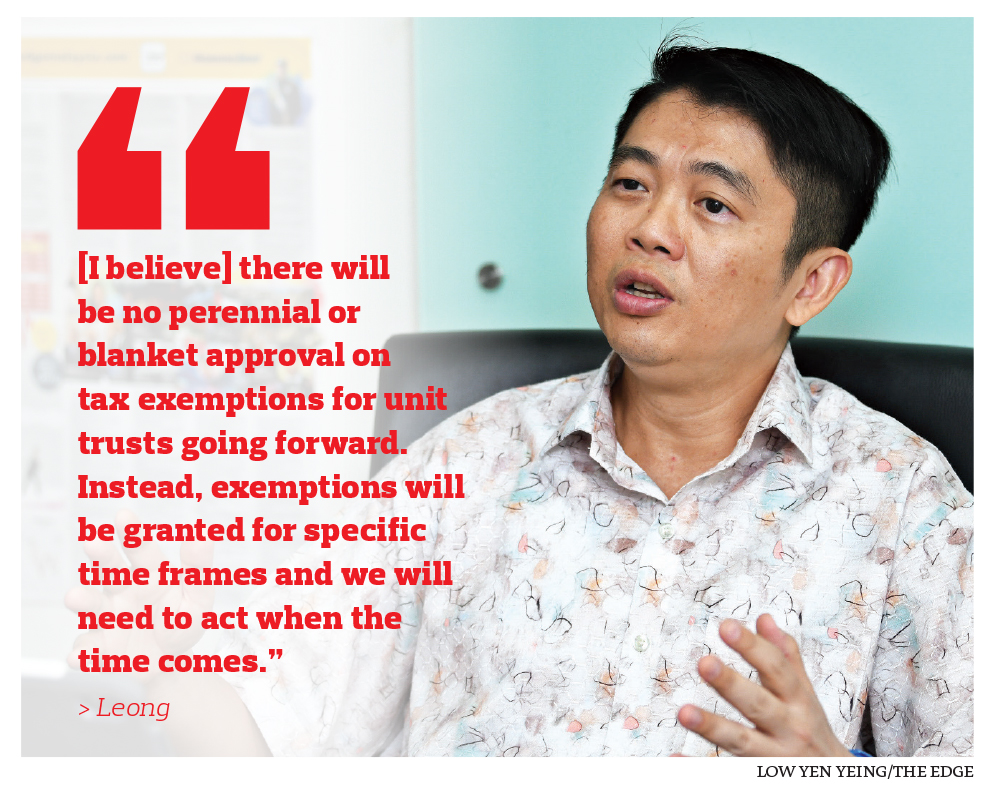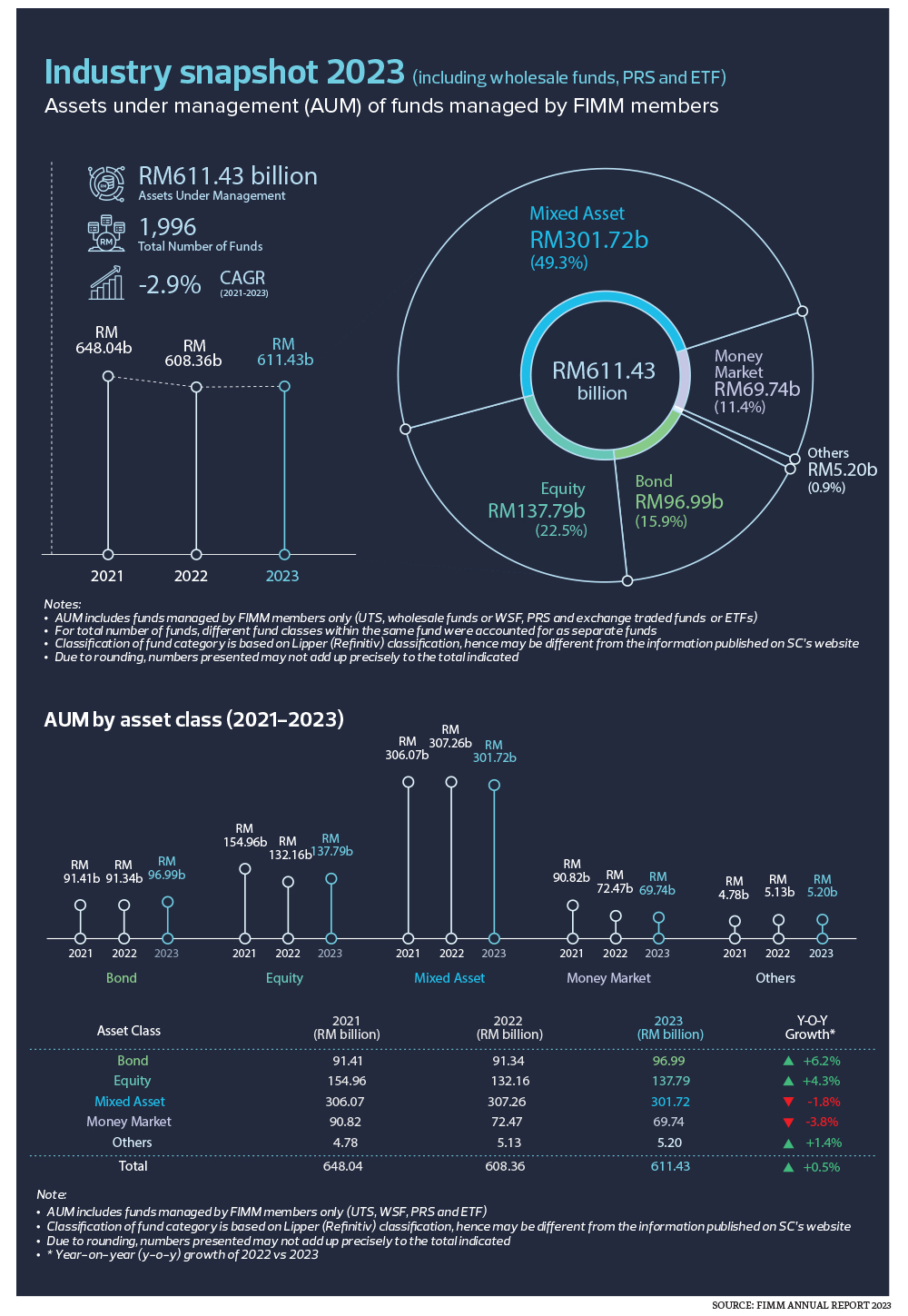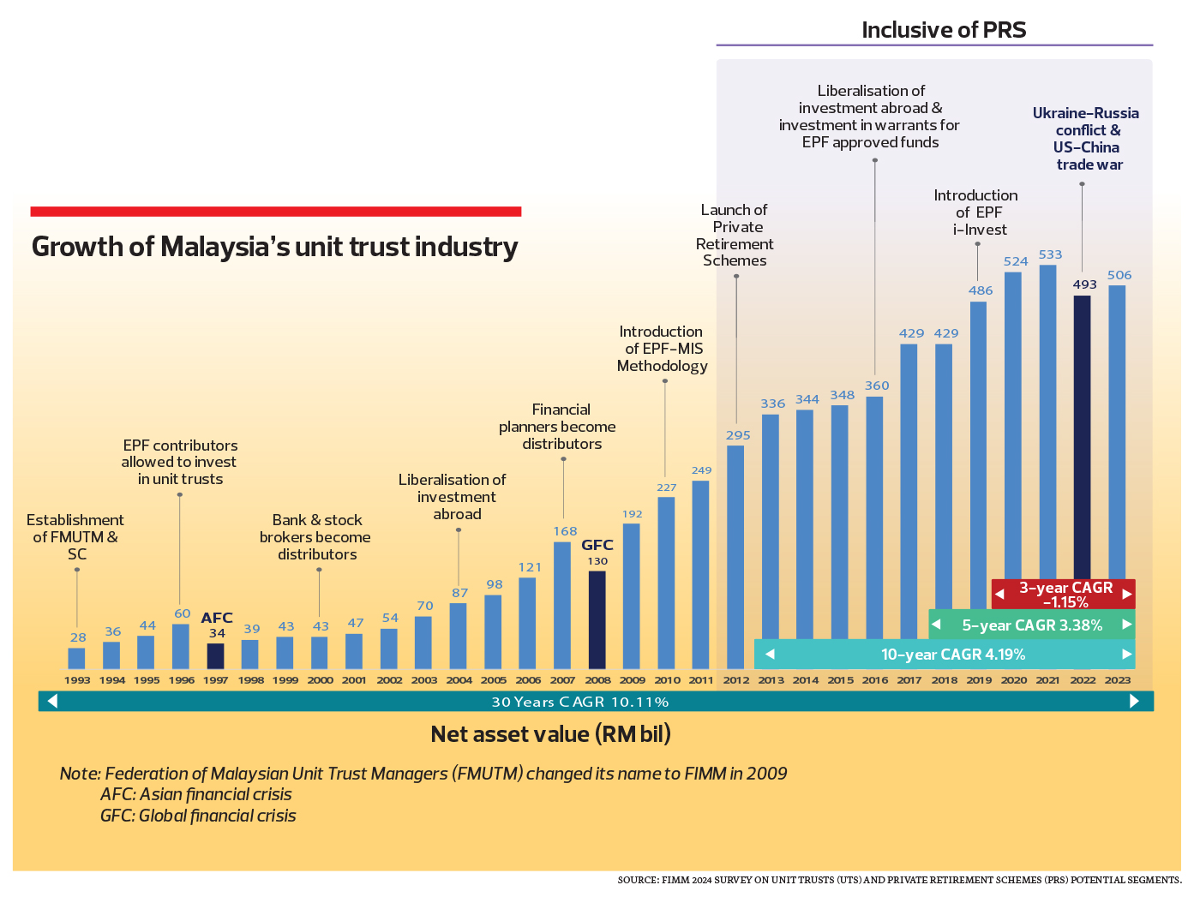This article first appeared in Wealth, The Edge Malaysia Weekly on December 30, 2024 - January 12, 2025
For Kaleon Leong, CEO of the Federation of Investment Managers Malaysia (FIMM), 2024 was about a battle fought and won.
In October 2023, a new tax regime for the fund management industry was announced during the tabling of Budget 2024, spooking industry players.
While the eventual outcome turned out to be favourable to the industry and investors, Leong remembers the period as one of the most stressful and challenging during his career in the industry.
A 10% capital gains tax (CGT) would be imposed on unlisted “shares”, which by definition and to the surprise of many, included bonds. Fixed income fund managers were worried as bond funds generate moderate but steady returns — usually slightly higher than fixed deposit rates — for investors, and the tax could reduce its attractiveness.
In addition, the foreign source income (FSI) tax would impose a 24% tax on the disposal of foreign capital assets, including shares. This would have a huge impact on unit trust funds that invest their clients’ money abroad.
Investors made their concerns heard. The government, after engaging with stakeholders, announced three months later that it would defer the new tax regime.
Minister of Finance II Datuk Seri Amir Hamzah said the exemption on CGT was effective Jan 1, 2024, to Dec 31, 2028, while the exemption on FSI would be in effect from Jan 1, 2024, to Dec 31, 2026.
That was a huge relief for investors, says Leong. “The exemption given to unit trust funds was recently gazetted. It was a win for the industry.”
Budget 2025, meanwhile, had good news for individuals who invest directly in overseas assets, as the exemption on FSI for individuals is slated to be extended for another 10 years until Dec 31, 2036.
On unit trust funds, Leong says: “[I believe] there will be no perennial or blanket approval on tax exemptions for unit trusts going forward. Instead, exemptions will be granted for specific time frames and we will need to act when the time comes.”
Challenging times
“Taxing” is how Leong describes the period before the government announced the tax exemption on unit trust funds.
“It was really taxing, in every sense. Many calls came in, even at night. Three to six months before the deadline, the level of concern intensified across the industry, from front to back office,” he recalls in an interview with Wealth.
The new tax regime had implications not only for investors who were just recovering from the pandemic, but also dozens of fund houses, even more unit trust distributors and roughly 60,000 unit trust agents who would have to explain the situation to their clients. If returns were not going to be as good moving forward, they would have to deal with many unhappy customers.
It was the first time Leong, and possibly the industry, had encountered such an issue.
Leong started his career as an auditor at PricewaterhouseCoopers (PwC) in 1996. He went on to become head of finance and portfolio services at AmInvestment Management Sdn Bhd, CEO of HSBC (Malaysia) Trustee Bhd and deputy general manager of investment management at Securities Commission Malaysia. In 2018, he took over the helm of FIMM.
Leong says the success in getting the tax exemptions was only possible due to the collaborative efforts of the industry players, including the SC, unit trust companies and distributors who provided FIMM with facts and statistics for the drafting of a comprehensive submission to the Ministry of Finance (MoF). The ministry was receptive to FIMM’s proposals and understood the industry’s concerns about the new tax regime.
Most of all, Leong appreciates the help of the tax advisers, including those from Deloitte, KPMG and PwC. “My phone was always open for calls and, likewise, they kept their lines open for discussions. They even volunteered their time pro bono, joining us at the MoF to present our case and outline the challenges. They assisted us with the necessary drafting and proposals and were incredibly supportive,” he says.
“It’s a collective effort. I’m merely a spokesperson. It is FIMM’s responsibility to ensure that unit trusts can continue to function as a tax-efficient investment option.”
Leong still remembers the day when representatives from the FIMM, SC and consulting firms met with representatives from the MoF and Inland Revenue Board (IRB), among others. It was a crucial moment that would influence the outcome of the exemptions, he says.
“Personally, the breakthrough moment came during our meeting with the regulators at Putrajaya, where we shared our justifications for exempting unit trusts from CGT and FSI tax. Then, we highlighted the significant contribution of unit trusts as a retirement saving tool. The discussions were positive. It will be remembered as one of FIMM’s biggest achievements.”
Industry continues to grow after six decades
Despite various challenges, the unit trust industry has continued to grow since 1959 when the first unit trust fund — aptly named the First Malaysian Fund — was launched.
Fast forward to September this year, and the industry has assets under management (AUM) of RM544.06 billion, an increase of 8.83% from RM499.88 billion as at end-2023. It is equivalent to 26.61% of Bursa Malaysia’s market capitalisation, according to the SC.
There were 39 approved asset management firms with 769 unit trust funds under them as at September 2024.
More importantly, the country registered 26.38 million unit trust accounts in 2023, of which more than 90% were for individual investors. According to Leong’s estimates, over 18 million Malaysians have invested at least some money in unit trust funds.
As 2024 comes to an end, things are looking bright for the industry. For one, more unit trust distributors have registered with FIMM.
Leong says two unit trust management companies — Capital Dynamics Asset Management Sdn Bhd and PHB Asset Management Bhd — registered with FIMM as distributors this year. There had not been any such registrations in the previous five years.
In addition, two institutional unit trust advisers registered with FIMM as distributors. They were Hong Leong Asset Management Bhd and Moomoo Securities Malaysia Bhd.
FIMM welcomed the registration of four corporate unit trust advisers as distributors — Firmus Financial Sdn Bhd, Resolute Planning Sdn Bhd, VPW Malaysia Sdn Bhd and Life Planners Sdn Bhd. “We have a lot of new distributors coming in and the number is at a record high,” says Leong.
Asked why so many firms are keen to distribute unit trust funds, he says it could be due to the strong rebound in the Malaysian stock market and the ringgit.
What surprised him the most in recent years is how the industry grew during the pandemic. When businesses closed, many Malaysians became unit trust agents while more invested in unit trust funds to ride the unexpected stock market rally.
He says about 10,000 people would sit for the exam to become a unit trust consultant in a normal year. But the number hit 20,000 during the pandemic period as many who worked in the tourism and hospitality industries lost their jobs and entered the unit trust industry instead.
“It was during the pandemic that the industry enjoyed its greatest boom. Total AUM went up to about RM520 billion and the number of unit trust accounts increased by two million in two years.”
Some attrition in the number of unit trust agents was seen this year, as some returned to their previous jobs.
Younger generation has less money for investments
Leong sees challenges ahead. For one, more Malaysians are struggling to save and invest while supporting themselves and their families.
He says FIMM conduced a survey in 2008 to find out the key reasons Malaysians invest in unit trust funds. The answers were mainly to invest for personal well-being, family and even the next generation.
FIMM did another nationwide survey in 2019, posing the same questions, and the answers were different from a decade ago. The respondents said they mostly invested for themselves as they did not have extra money to invest for their families.
In 2023, FIMM repeated the survey. “We found that post-pandemic, people will only invest if they have excess money. This was unlike in 2008, when investors were not only investing for themselves, but also for their loved ones. In 2019, some investors were still able to invest for their loved ones. Today, many are just trying to take care of themselves. Post-pandemic, the situation is dire,” warns Leong.
More complex alternative investments, which are unregulated, have also emerged on the market. Those who dip their toes into these investments may lose their life savings, or worse, he highlights.
While he keeps an eye on digitalisation, Leong does not think it will disrupt the industry in a big way, at least not in the near future.
“Our research and surveys indicate strong demand for personalised advice. We also acknowledge that digital traction among unit trust investors is gaining momentum, especially among the younger generation who feel more comfortable with investing through digital platforms. One area that I hope can be improved is the digital complaint process. Try complaining through a chatbot,” he says.
The key point is that investors now have more choices.
“I don’t have a crystal ball … But the thing is, variety is always good for investors. And the unit trust industry has been here long enough to adapt to changes.”
Save by subscribing to us for your print and/or digital copy.
P/S: The Edge is also available on Apple's App Store and Android's Google Play.
- China said to pause new deals with Li Ka-shing, family following plan to sell Panama ports to BlackRock-led consortium
- Former Maybank CEO Farid Alias redesignated as Bursa non-executive chairman from May, replacing Abdul Wahid who is retiring
- ASNB declares RM2.18b distribution for FY2025, with ASB 2 at 5.50 sen per unit, ASM at five sen
- Pos Malaysia’s stock surges 36%, trading volume rises to over four-year high
- Indonesia to use one million African weevils to spur palm output
- KL Sustainability Summit to tackle transboundary haze, says Nik Nazmi
- US corporate profits surge in fourth quarter
- Myanmar junta preparing for December election, says top general
- US health department cutting 10,000 workers under Kennedy
- Former KL Tower operator sues LSH Capital, govt over concession award




